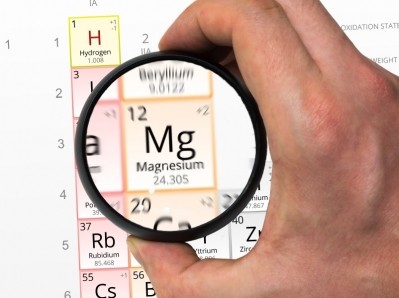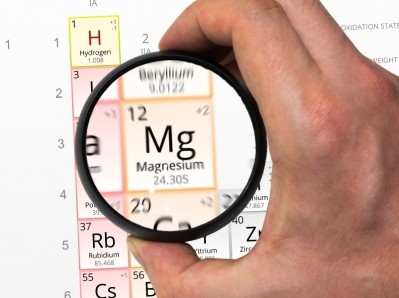SPECIAL EDITION: INNOVATIONS IN MINERALS
Magnesium sales to surpass calcium sales by 2020?

With between 70 and 80% of the US population not meeting their recommended intakes of magnesium, consumers – and the health care professionals who advise them - are waking up to the importance of the mineral.
Todd Johnson, Director of Marketing for Albion Minerals, told us: “According to market forecasts, we can expect magnesium sales in the nutrition market to surpass calcium by 2020.”
According to SPINS, US sales of magnesium supplements across natural, specialty gourmet and conventional multi outlet channels* grew 15.2% to $85,217,687 for the 52 weeks ending January 24, 2016, up from $73,993,936 from the previous 52 weeks.
The conventional multi-outlet channel remains the largest, with $59,163,923 in sales for the 52 weeks ending January 24, 2016, up 12.9% from $52,382,031 from the previous 52 weeks. However, both the natural and specialty gourmet channels posted growth in excess of 20%. The natural channel sales were $25,395,683 for the 52 weeks ending January 24, 2016, while specialty gourmet accounted for only $658,081, said SPINS.
“Magnesium has been overlooked in the past. It was dubbed the forgotten mineral,” said Tim van de Gehuchte, business development manager for mineral ingredient supplier Isaltis (SEPPIC is the exclusive distributor for US and Canada for Isaltis). “Much more attention was being paid to calcium. However research is slowly catching up, recognizing that it is equally important to calcium.”
Benefits
The National Institutes of Health (NIH) lists magnesium as being necessary for more than 300 biochemical reactions in the body, from helping maintain normal muscle and nerve function, to keeping heart rhythm steady, supporting a healthy immune system, and keeping bones strong. The mineral is also needed for blood sugar management, and healthy blood pressure.
The European Food Safety Authority (EFSA) has issued positive opinions on magnesium and the maintenance of normal bone, teeth, and protein synthesis; the reduction of tiredness and fatigue; electrolyte balance; normal energy-yielding metabolism; neurotransmission, and muscle contraction. However, the agency was not convinced by claims about magnesium and blood glucose, blood pressure, stress relief, protection of DNA, proteins and lipids from oxidative damage, the immune system and fat metabolism.
“Magnesium has a lot of health benefits. Consumers today know magnesium is good for mental health and to fight muscle cramps. However, magnesium does so much more,” said van de Gehuchte.
“With roughly 75% of the population being deficient in magnesium, consumer are taking magnesium supplements to fill this gap,” he added.
Albion's Johnson said that the list of benefits includes muscle, sleep, cardiac, and cognitive health, and that these are becoming more well-known as much research is done in these areas.
‘One of the most important nutritionally-required minerals’
Johnson added that many studies have been conducted specifically on its chelated magnesium products, as well. “In these studies, researchers have found them to have a positive influence on energy, asthma, migraine, PMS, skeletal muscle, and cardiovascular indicators,” he said.
“In reviewing the extensive research about magnesium, it is clear that it is one of the most important nutritionally-required minerals,” he added.
Among the emerging health benefits associated with the mineral, data supporting a potential benefits for metabolic syndrome are among the most exciting, said the Albion spokesperson.

For example, a study in Diabetes Care (Song Y, et al. 2005, Vol. 28, pp. 1438-44) found that magnesium intake is inversely associated with systemic inflammation and the prevalence of the metabolic syndrome in middle-aged and older women.
More recently, scientists from Case Western Reserve University in Cleveland reported in the British Journal of Nutrition (Moore-Schiltz et al., 2014, Vol. 114, pp. 924-35) that data from the National Health and Nutrition Examination Survey (NHANES) showed an inverse association between magnesium intakes and metabolic syndrome, with the highest intakes (over 355 mg per day) linked to a 30% lower risk of Metabolic Syndrome, compared with people with lowest average intakes (less than 197 mg per day)
A dose-dependent response was reported in Nutrients (Sang-Yhun Ju et al., 2014, Vol. 6, pp. 6005-6019) by scientists from The Catholic University of Korea. Data from eight cross-sectional studies and two prospective cohort studies indicated that for every 150 mg/day increase in magnesium intake the risk of metabolic syndrome decreased by 12%.
“However, the data available for levels greater than 450 mg/day of magnesium intake were sparse, and additional studies, particularly longitudinal studies, are needed to provide more in-depth analyses, more precise and stable estimates of association and a better understanding of the potential role of magnesium intake in the risk of metabolic syndrome,” wrote the Korean scientists. “Randomized clinical trials will also be necessary to address the issue of causality and to determine whether magnesium supplementation is effective for preventing metabolic syndrome.”
Forms
Suppliers are innovating with the forms, and Isaltis’ van de Gehuchte said that attention should be paid to the salt form.
“Magnesium is typically absorbed in the small intestine, more exactly in the jejunum and ileum where the pH is around 7.5,” he explained. “Before reaching the jejunum and ileum, magnesium needs to pass the oesophagus (pH 7), stomach (pH around 1.8) and duodenum (pH around 5). So it needs to pass through a very wide pH range, but at the same time it needs to stay soluble. If it precipitates before the jejunum/ileum, it is not bioavailable and will not be absorbed by the body.
“Among the different magnesium salts out there, there is one salt that stays soluble throughout this whole pathway. This magnesium salt is magnesium glycerophosphate. Magnesium glycerophosphate is a chelate formed between magnesium and glycerophosphate. Glycerophosphate is a body known molecule. Our own bodies produce glycerophosphates which are involved in the synthesis of cell membranes and energy production (glycerol-3-phosphate shuttle) amongst others. Glycerophosphate salts are really remarkable salts and characterized by a very high bioavailability.”
Albion also offers highly bioavailable magnesium forms. Its Bisglycinate Chelate is highly bioavailable and gentle (low tendency for laxation), when compared to other magnesium ingredients, said the company.
“Albion’s minerals chelated with amino acids have shown greater bioavailability and utilization in humans. Less irritation has been indicated in human studies from ingesting its minerals as metal amino acid chelates," said Johnson.
“While magnesium is such a crucial macro-mineral, it is also one of the most frequently encountered dietary deficiencies in the US and throughout the world. Albion’s magnesium amino acid chelate compounds have shown to be of benefit in a variety of conditions. The Albion TRAACS brand of magnesium chelates have demonstrated extremely high bioavailability, and are an excellent choice whenever magnesium is required in dietary supplements, food fortification, or pharma applications.”
* The SPINS data included SPINSscan Natural, SPINSscan Specialty Gourmet & SPINSscan Conventional.
SPINSscan Natural tracks sales of all UPC-coded products sold in the natural supermarket channel. Exclusive to SPINS, this channel represents full-format natural product supermarkets including the National Cooperative Grocers Association (NCGA) and the Independent Natural Food Retailers Association (INFRA), small to mid-sized chains, and independent and cooperative stores across the continental US. * excludes Whole Foods
SPINSscan Specialty Gourmet tracks sales of UPC-coded products sold in the specialty supermarket channel. We classify specialty gourmet stores as full-format supermarkets with more than $2 million in annual sales, with SPINS-defined specialty items comprising at least 25% of their overall volume. The Specialty Gourmet Channel is represented by more than 1,000 specialty supermarket stores that have traditionally been undistinguished within broader retail measurement services.
SPINSscan Conventional is a joint service through SPINS and IRI Worldwide, and is the industry’s only comprehensive source of information on UPC-coded Natural, Organic, Specialty,and Wellness positioned products selling through Conventional outlets in the US.
















